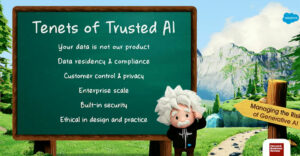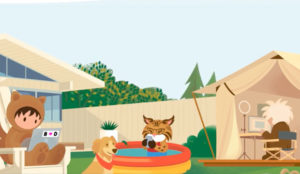
I just wrote a note to a friend of mine thanking him for his participation at a conference I recently helped organize. It was a thank you note, and he’s a CRM industry influencer; I won’t divulge names, because it’s not important to my point, nor do I want to seen like too much of a suck-up.
In any event, I was grateful for his participation in the show — not just for his session, but for his behavior at this and every other CRM event he goes to. When he’s at an event, he’s not wrapped in a bubble of superiority, nor does he retreat into private meetings and become impossible to find for those who wish to ask him questions. He’s out there, socializing with the masses.
His behavior is an object lesson in what CRM should be at its most elemental levels: It’s about connecting with customers — and customers are people first.
When my friend’s at an event, he embodies three great things that good people have going for them — and that great companies have going for them, too.
No. 1: He’s There for People
I’ve done a lot of CRM events; it can be very enticing to disappear for a nap, or to cut out early, or to hit the links one afternoon. However, that comes at the expense of interacting with your peers; you cheat them of the chance to learn from you, and you cheat yourself out of the chance to learn from them. Those are, ostensibly, the two major reasons you’d go to a trade event.
Businesses do the same things: They keep strange hours, often including customer service; their online presence in social media may be inconsistent; and the attention they pay to their customer community can wax and wane with changing internal priorities.
Customers don’t expect that — they’re seeking answers or help, and they think your business is present and aware enough to help them. Your business probably already communicates that idea to them. So figure out how to be there for people — or set expectations, especially if you’re a small business. If you’re straight with your customers, they will surprise you with their willingness to work with you.
No. 2: He Listens to People
It’s got to be rough hearing the same things from people over and over again. When you’re thought of as an expert, folks come to you — and as one CRM practitioner once lamented, “Everyone seems to think their situation is absolutely unique — and they never are.”
After a while, you do start to hear the same tales of woe again and again. You may think it’s not that important for you to hear these stories once more. But guess what? It’s probably very important to the person telling you the story to be able to tell it to someone who understands.
Most of the things you hear from your customers will be repetitious. You may hear the same complaints, or the same requests for service, or even the same product recommendations. However, every customer expressing these things is not viewing the communication as part of a larger, redundant trend (as you might). Rather, the customer is voicing that concern or suggestion to you for the very first time as an individual.
That makes it important for you to do two things: One, provide the channels of communication so these messages can reach you; and two, develop answers that address these questions or concerns appropriately. You need to forget every previous time a message came your way and treat this conversation as new and unique — but recall how you addressed your past interactions on the subject.
Empathetic people can do this — the answers they give feel like they’re given for the first time, but behind the answers is a set of accumulate knowledge.
3. He Enjoys People
My friend deliberately puts himself in settings where he’ll meet people. He’s gregarious even as he works the busy schedule of a show. He works at it — not as a schmoozer, but as a person who genuinely relishes the company of others.
Does your business do that? Are you excited to engage with customers, even when you’re not collecting lead data or signing a contract or cashing their checks? It’s not necessary to like all your customers, but being inclined to like them puts you in a much better position to convey a winning attitude through the customer lifecycle.
That translates into a greater likelihood of loyalty; it breaks down barriers during the sales process; it puts you in a better position to anticipate buying needs — and it’s a lot more fun to go through business this way than to be in an adversarial, hunter-and-prey mode.
A lot of this hinges on corporate culture. Is it fun to work at your company? If it is, it’s likely that employees will be more inclined to enjoy talking to your customers. Heck — encourage them to seek out customers and find ways to learn about them. CRM in the social era needs to be less about someone in sales and marketing collecting data and interpreting who customers are, and more about real knowledge based on genuine interaction and engagement.
Those are three extremely broad CRM traits, but they work. My friend does pretty well for himself; he knows the people he runs into may become customers, so he gets to know them, and he allows them to know him.
Can those traits be learned or taught? That is another matter entirely. I would submit, however, that if you plan on being a CRM leader in your company, you must embody these traits — or make a darned good effort to learn to do so. And if you’re looking to hire someone to manage your CRM efforts, watch for people like my friend. Even if they are not authorities on the technology yet, you’ll benefit from their innate understanding of the concepts of forming relationships.























































